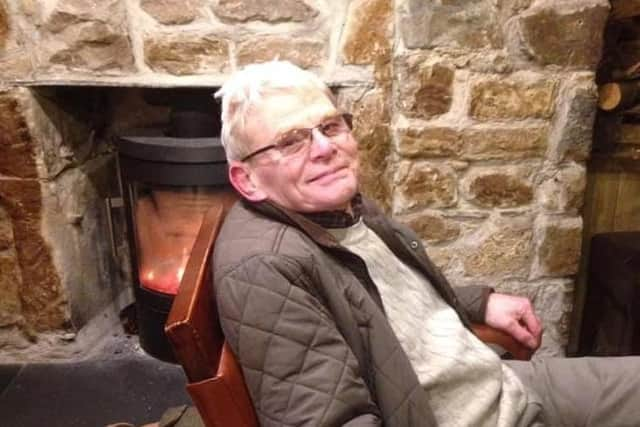Dementia project helping Fife families


It was 2003, and Jack, recently retired after a 38-year career at Leuchars that had seen him named Station Commander and Air Officer for Scotland and Northern Ireland, had been for a visit while Lesley was looking after her parents.
‘I believe he is showing signs of dementia’, the doctor told Lesley.
Advertisement
Hide AdAdvertisement
Hide AdIt would be another year before Jack, just 58, got the diagnosis: Alzheimer’s.


However, it was far from the end – it would be another 13 years before Jack died at the end of 2017 – and Lesley, with the help of her family, was intent on making sure he had a good life in his St Andrews home.
One of the first things that Lesley did was let people know: “I said ‘we are going to tell people’.
“The last thing I wanted was people talking behind his back. I find Scots are a little bit more reserved, they don’t talk about illness. His peers found it quite difficult to handle. But my sons-in-law and their friends were fantastic. The young people were really good and supportive.”
Advertisement
Hide AdAdvertisement
Hide AdRuth McCabe, project manager at Dementia Friendly Fife, a Fife Health and Social Care Initiative, said Jack benefitted from the social network Lesley and daughter Vanessa built around him, allowing him to continue living a normal life as long as possible.
And while Lesley described the final stages of the disease as “ghastly”, Vanessa said that her father was able to have ten ‘good years’, before three ‘tough ones’.
“Those years were incredibly valuable,” she said.
“It wasn’t the life we knew. My children didn’t know the man I knew, but they knew a different type of man. He couldn’t read so my five-year-old read to him. They would help him put on his pyjamas.
“It can change personality. That can be difficult. By people not understanding that, it can make them not want to go out.”
Advertisement
Hide AdAdvertisement
Hide AdLesley and Vanessa now support the Dementia Friendly Fife project, helping with training and providing advice, so people with the disease can continue to live a normal life.
For example, Vanessa would take her father to St Andrews Brewing Co, where the staff knew that he had Alzheimer’s and would help him, such as providing him with a smaller cup that made it more difficult to spill his drinks.
The Dementia Friendly Fife project started in October 2018, challenging businesses, organisations, charities and individuals to sign up to become ‘dementia friendly’.
It means taking a short course, online or in person, to learn more about the disease and what you can do to help those living with it.
Advertisement
Hide AdAdvertisement
Hide AdThere are now more than 6000 ‘dementia friends’ in the Kingdom, with over 250 Fife businesses having taken part.
“The campaign gives people in the earlier stages of dementia more opportunities to be inclusive in a normal environment,” said Lesley.
“I think that’s the key. We’ve tried to let people engage with the local community for as long as possible.”
Speaking about Jack’s case, Ruth added: “The good thing is family and friends stayed connected because they understood and were willing to lend a hand.
Advertisement
Hide AdAdvertisement
Hide Ad“That makes a difference and can keep people at home. It keeps people as normal as possible.
“What we need to avoid is people shutting themselves up in their house, with their family and friends, because they are too scared to go out.”
But what would be Lesley and Vanessa’s advice to families of people with dementia?
For Vanessa, it’s about asking for help: “Don’t be afraid to learn. Don’t be too frightened to engage. The more people are engaged and aware, it benefits the whole community.”
Advertisement
Hide AdAdvertisement
Hide AdLesley added: “I think, most importantly, accept the diagnosis. Be open and tell people.
“There is nothing worse than people talking behind your back. The more we talk about it, the more acceptable it will become. There is still a stigma attached to dementia and there shouldn’t be.
“People say to me ‘you’re very strong’. You have to learn to accept the situation and live with it You can’t change the diagnosis.”
The online ‘dementia friendly’ course can be completed at www.dementiafriendsscotland.org.
Advertisement
Hide AdAdvertisement
Hide AdIt takes around 15 minutes to complete and, at the end of the videos, you can download a certificate to show that you are a ‘dementia friend’.
For information and support about dementia call the Alzheimer Scotland helpline, on 08088083000.